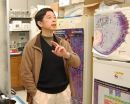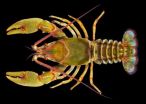Elazer Edelman, professor in the MIT-Harvard Division of Health Sciences and Technology (HST), says that implanting such cells adjacent to a patient's tumor could shrink a tumor or prevent it from growing back or spreading further after surgery or chemotherapy. He has already tested such an implant in mice, and MIT has licensed the technology to Pervasis Therapeutics, Inc., which plans to test it in humans.
Edelman describes the work, which appears in the Jan. 19 issue of the journal Science Translational Medicine, as a "paradigm shift" that could fundamentally change how cancer is understood and treated. "This is a cancer therapy that could be used alone or with chemotherapy radiation or surgery, but without adding any devastating side effects," he says.
Cells that line the blood vessels, known as endothelial cells, were once thought to serve primarily as structural gates, regulating delivery of blood to and from tissues. However, they are now known to be much more active. In the 1980s, scientists discovered that endothelial cells control the constriction and dilation of blood vessels, and in the early 1990s, Edelman and his postdoctoral advisor, Morris Karnovsky, and others, discovered an even more important role for endothelial cells: They regulate blood clotting, tissue repair, inflammation and scarring, by releasing molecules such as cytokines (small proteins that carry messages between cells) and large sugar-protein complexes.
Many vascular diseases, notably atherosclerosis, originate with endothelial cells. For example, when a blood vessel is injured by cholesterol, inappropriately high blood sugar, or even physical stimuli, endothelial cells may overreact and provoke uncontrolled inflammation, which can further damage the surrounding tissue.
Edelman and HST graduate student Joseph Franses hypothesized that endothelial cells might also play a role in controlling cancer behavior, because blood vessels are so closely entwined with tumors. It was already known that other types of cells within tumors, known collectively as the tumor stromal microenvironment, influence cancer cell growth and metastasis, but little was known about how endothelial cells might be similarly involved.
In the new study, Edelman, Franses and former MIT postdoctoral fellows Aaron Baker and Vipul Chitalia showed that secretions from endothelial cells inhibit the growth and invasiveness of tumor cells, both in cells grown in the lab and in mice. Endothelial cells secrete hundreds of biochemicals, many of which may be involved in this process, but the researchers identified two that are particularly important: a large sugar-protein complex called perlecan, and a cytokine called interleukin-6. When endothelial cells secrete large amounts of perlecan but little IL-6 they are effective at suppressing cancer cell invasion, whereas they are ineffective in the opposite proportions.
The researchers theorize that there is a constant struggle between cancer cells and endothelial cells, and most of the time, the endothelial cells triumph. "All of us, every day, are exposed to factors that cause cancer, but relatively few of us exhibit disease," says Edelman. "We believe that the body's control mechanism wins out the bulk of the time, but when the balance of power is reversed cancer dominates."
The struggle also depends on a third player, the endothelial cells' extracellular matrix — structural proteins that pave blood vessels and on which the endothelial cells reside. Endothelial cells only function properly when their extracellular matrix is stable and of the correct biochemical composition. Under normal conditions, if a cell becomes cancerous, the endothelial cell may then keep it in check. However, the cancer cell fights back by trying to destroy the extracellular matrix or change the endothelial cell directly, both of which hinder the endothelial cell's efforts to control the cancer.
"There is this three-way balance that needs to be achieved," says Edelman. The more aggressive a cancer cell, the more likely it is to overcome the endothelial cells and extracellular matrix, allowing it to spread to other tissues.
Several years ago, Edelman began using endothelial cells, grown within a scaffold made of denatured, compressed collagen (a protein that makes up much of human connective tissue), as an implantable device. The "matrix-embedded endothelial cells" served as a convenient unit that could be produced in bulk, tested for quality control, retained intact for months and implanted immediately when needed. This way, the healthiest cells could be selected to secrete all of the chemicals normally released by endothelial cells and placed in multiple locations in the body to control disease.
In clinical trials these implants were placed around blood vessels after vascular surgery and controlled local clotting and infection better than devices without cells. Significantly, because the endothelial cells were associated with a matrix mimicking their natural state, even cells from other people could be implanted without being rejected by the patients' immune systems. No major side effects were seen in the clinical trials,
"Blood vessels and endothelial cells are the perfect regulatory units and our synthetic device recapitulated these control units perfectly," says Franses. Blood vessels penetrate to the deepest recesses of tumors, and in doing so carry the powerful regulatory endothelial cells as close to cancer cells as possible. The extracellular matrix backbone of the vessels can keep the endothelial cells healthy and the healthy endothelial cells control nearby cancer cells. "This is what we mimicked with our devices," he says. "In a sense it is like putting a cellular policeman on the corner of every tumor neighborhood."
In one mouse experiment reported in the new paper, endothelial cell implants significantly slowed tumor growth and prevented gross destructive change in tumor structure. Another experiment showed that cancer cells that had been grown in the secretions of endothelial cells were less able than standard cancer cells to metastasize and colonize the lungs of mice.
The new findings could also explain why drugs that suppress angiogenesis — growth of new blood vessels — have shown only transient and moderate benefit for cancer patients thus far. "You starve the tumor of its blood supply, but you also damage tumor blood vessel endothelial cells, so when the tumor comes back, there's nothing to keep it in check. The vessels feed the tumor but their endothelial cells control the cancer cells within. Giving the endothelial cells without the blood vessels provides the best of both worlds and perhaps one day could provide new means of cancer therapy," says Edelman.
###
Source: "Stromal Endothelial Cells Directly Influence Cancer Progression," by Joseph W. Franses, Aaron B. Baker, Vipul C. Chitalia, Elazer R. Edelman. Science Translational Medicine, 19 January, 2011.
Funding: NIH, NIH Medical Scientist Training Program, American Heart Association Scientist Development, and NIH–National Institute of Diabetes and Digestive and Kidney Diseases and National Kidney Foundation Young Investigator Grant.
END


